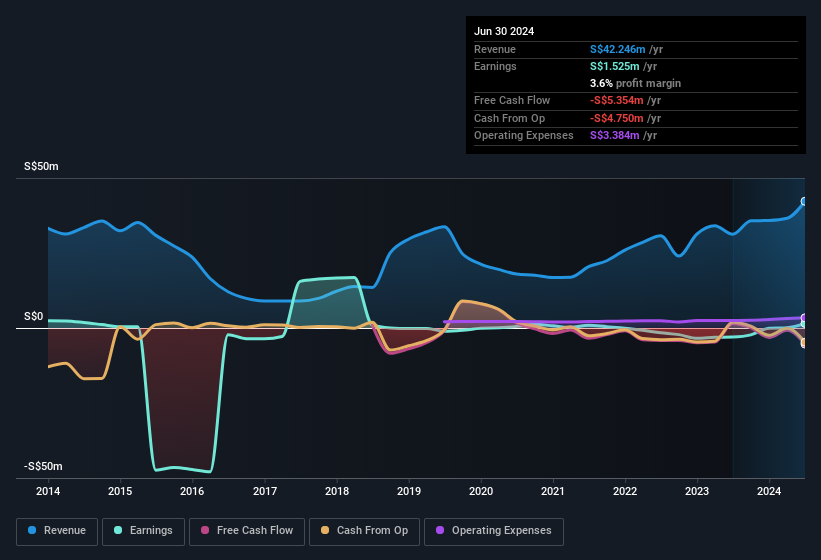- Singapore
- /
- Basic Materials
- /
- SGX:BAZ
We Think Shareholders Should Be Aware Of Some Factors Beyond Lion Asiapac's (SGX:BAZ) Profit
Lion Asiapac Limited's (SGX:BAZ) stock rose after it released a robust earnings report. While the headline numbers were strong, we found some underlying problems once we started looking at what drove earnings.
See our latest analysis for Lion Asiapac

Zooming In On Lion Asiapac's Earnings
Many investors haven't heard of the accrual ratio from cashflow, but it is actually a useful measure of how well a company's profit is backed up by free cash flow (FCF) during a given period. In plain english, this ratio subtracts FCF from net profit, and divides that number by the company's average operating assets over that period. The ratio shows us how much a company's profit exceeds its FCF.
As a result, a negative accrual ratio is a positive for the company, and a positive accrual ratio is a negative. While it's not a problem to have a positive accrual ratio, indicating a certain level of non-cash profits, a high accrual ratio is arguably a bad thing, because it indicates paper profits are not matched by cash flow. To quote a 2014 paper by Lewellen and Resutek, "firms with higher accruals tend to be less profitable in the future".
Over the twelve months to June 2024, Lion Asiapac recorded an accrual ratio of 0.41. As a general rule, that bodes poorly for future profitability. And indeed, during the period the company didn't produce any free cash flow whatsoever. In the last twelve months it actually had negative free cash flow, with an outflow of S$5.4m despite its profit of S$1.53m, mentioned above. We saw that FCF was S$1.5m a year ago though, so Lion Asiapac has at least been able to generate positive FCF in the past. Having said that, there is more to the story. We can see that unusual items have impacted its statutory profit, and therefore the accrual ratio. One positive for Lion Asiapac shareholders is that it's accrual ratio was significantly better last year, providing reason to believe that it may return to stronger cash conversion in the future. As a result, some shareholders may be looking for stronger cash conversion in the current year.
Note: we always recommend investors check balance sheet strength. Click here to be taken to our balance sheet analysis of Lion Asiapac.
How Do Unusual Items Influence Profit?
The fact that the company had unusual items boosting profit by S$979k, in the last year, probably goes some way to explain why its accrual ratio was so weak. While we like to see profit increases, we tend to be a little more cautious when unusual items have made a big contribution. We ran the numbers on most publicly listed companies worldwide, and it's very common for unusual items to be once-off in nature. And, after all, that's exactly what the accounting terminology implies. Lion Asiapac had a rather significant contribution from unusual items relative to its profit to June 2024. As a result, we can surmise that the unusual items are making its statutory profit significantly stronger than it would otherwise be.
Our Take On Lion Asiapac's Profit Performance
Summing up, Lion Asiapac received a nice boost to profit from unusual items, but could not match its paper profit with free cash flow. For all the reasons mentioned above, we think that, at a glance, Lion Asiapac's statutory profits could be considered to be low quality, because they are likely to give investors an overly positive impression of the company. If you want to do dive deeper into Lion Asiapac, you'd also look into what risks it is currently facing. Every company has risks, and we've spotted 3 warning signs for Lion Asiapac (of which 2 are significant!) you should know about.
Our examination of Lion Asiapac has focussed on certain factors that can make its earnings look better than they are. And, on that basis, we are somewhat skeptical. But there is always more to discover if you are capable of focussing your mind on minutiae. Some people consider a high return on equity to be a good sign of a quality business. While it might take a little research on your behalf, you may find this free collection of companies boasting high return on equity, or this list of stocks with significant insider holdings to be useful.
New: AI Stock Screener & Alerts
Our new AI Stock Screener scans the market every day to uncover opportunities.
• Dividend Powerhouses (3%+ Yield)
• Undervalued Small Caps with Insider Buying
• High growth Tech and AI Companies
Or build your own from over 50 metrics.
Have feedback on this article? Concerned about the content? Get in touch with us directly. Alternatively, email editorial-team (at) simplywallst.com.
This article by Simply Wall St is general in nature. We provide commentary based on historical data and analyst forecasts only using an unbiased methodology and our articles are not intended to be financial advice. It does not constitute a recommendation to buy or sell any stock, and does not take account of your objectives, or your financial situation. We aim to bring you long-term focused analysis driven by fundamental data. Note that our analysis may not factor in the latest price-sensitive company announcements or qualitative material. Simply Wall St has no position in any stocks mentioned.
About SGX:BAZ
Lion Asiapac
An investment holding company, engages in lime manufacturing and sales activities in Malaysia and Singapore.
Excellent balance sheet and good value.
Market Insights
Community Narratives



